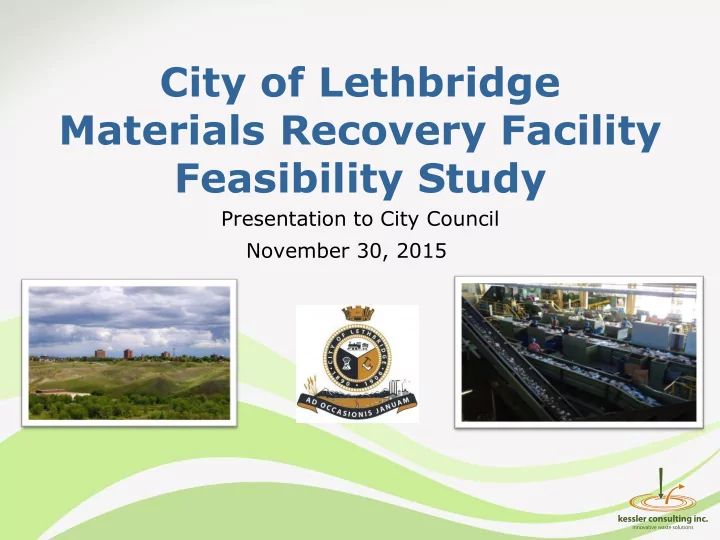

City of Lethbridge Materials Recovery Facility Feasibility Study Presentation to City Council November 30, 2015
Scope of Work Identify & assess recyclable materials for curbside collection & MRF Establish design parameters, process Provide flow, & conceptual recommendation design regarding potential MRF development in Assess ownership & operational scenarios Lethbridge Assess financial feasibility 2
Recyclable Materials Assessment • Curbside single stream recyclables: • Fiber: newspaper, cardboard, mixed paper & paperboard • Containers: aluminum cans & foil, steel cans, plastic containers, paper cartons & glass containers • Recycling station recyclables: • Same list as curbside materials • Other materials: plastic bags, shredded paper 3
Sample MRF Processing System 4
MRF Process Flow Diagram ..\SchematicPFD.pdf 5
Lethbridge MRF Design Capacity • Design capacity: • 15-year tonnage projection for facility sizing: • City-only residential and portion of commercial recyclables: 5 tph increasing to 9 tph • Including regional recyclables from communities within 150 km: 5 tph increasing to 12 tph • Conclusion: • Base MRF analysis on 10 tph design capacity 6
Lethbridge MRF Design Parameters • Building Size 27,000 – 34,000 square feet • Minimum 25 ft height for processing system and truck access • Tipping floor with 2-day capacity • Area for processing system (18K – 24K s.f.) • Bale storage area • Office, employee facilities, public meeting space • Site Size minimum 3 acres, preferably more • Truck scale and off-street queuing • Shipping container staging area • Employee & visitor parking • Truck traffic • Potential parking for recycling collection fleet 7
Assessment of Existing Facilities • Progressive & Paper Trail • Neither site provides sufficient area • Both buildings would require extensive expansion & modification • Both facilities are fully utilized for existing company activities which would need to be relocated if use for City MRF was possible • Recommendation: • MRF should be developed on a new site, potentially one already owned by the City 8
Ownership & Operations Assessment City Owned & Privately Owned & City Owned & Operated Operated Privately Operated Control of Critical City Yes No Yes Infrastructure Competition / Initially / Recurring / Not applicable Contract Term Long Term Short Term Capital Financing Cost Lower Higher Lower Private Capital Risk None Both Profit Margin Cost / Profit Margin Prior Development No Yes No Experience Prior Operating No Yes Yes Experience Labor Cost Higher Lower Lower Commodity Market No Yes Yes Experience 9
Ownership & Operations • Recommendation: • If City decides to pursue MRF development, utilize a public-private partnership based on City developing and owning the facility and a competitive selection of a private company to operate the MRF • Alternative: • City partners with local non-profit work center to provide labor and City provide MRF management and other staffing 10
MRF Development Timeline • New MRF development phases: • Design, engineering, procurement, construction, equipment installation, performance testing, & commissioning • 18 months required for new 10 tph MRF not including site acquisition, investigation & permitting Q1 Q2 Q3 Q4 Q5 Q6 Site & Facility Design Design-Build Procurement Equipment Procurement Site & Facility Development Equipment Fabrication & Install Commissioning 11
Financial Analysis Relative Impact of Major Financial Variables City Owned & Privately Owned & City Owned & Operated Operated Privately Operated Land Acquisition Possibly No Possibly Yes Possibly No Cost of Borrowing Lower Possibly Higher Lower Labor & Benefits Higher Lower Lower Other Direct Costs Similar Similar Similar Revenue Similar Similar Similar Profit Margin No Yes Yes 12
Financial Analysis Total and Net Annual Cost per Tonne City Owned & Privately Owned & City Owned & Operated Operated Privately Operated Capital Cost Facility Development & $11.4MM - $12.0MM $12.0MM - $12.6MM $11.4MM - $12.0MM Rolling Cost Net Annual Cost Year 1 Total Annual Cost $152 - $160 $161 - $169 $146 - $154 Revenue ($97) - ($102) ($97) - ($102) ($97) - ($102) Net Annual Cost (Revenue) $55 - $58 $64 - $66 $49 - $52 Year 15 Total Annual Cost $113 - $118 $115 - $120 $107 - $112 Revenue ($100) - ($105) ($100) - ($105) ($100) - ($105) Net Annual Cost (Revenue) $13 - $13 $15 - $15 $7 - $7 13
Financial Analysis Net Annual Cost $800,000 $700,000 $65 $600,000 $57 $51 $500,000 $400,000 $15 $300,000 $13 $200,000 $7 $100,000 $0 2018 2019 2020 2021 2022 2023 2024 2025 2026 2027 2028 2029 2030 2031 2032 City O&O Private O&O City O & Private O 14
Summary • A MRF to service a City curbside single stream recycling program is technically and financially feasible • If the City chooses to move forward with implementation, KCI recommends a new MRF developed using a public-private partnership based on City development & ownership and private sector operation. 15
Questions & Discussion Thank you for your time! 16
Recommend
More recommend